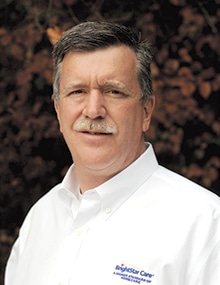
So the adult child calls and tells me “this time it’s going to be different” I don’t care what they say, this time we’re getting them help”. (By help I mean someone coming into the home to help with personal needs or to help prevent falls, and/or help around the house.) So I go meet the elderly parent(s) and the child that has called and as I’ve already been informed, mom and dad have no idea why that child is concerned. Sometimes the parent is finally ready to accept assistance in the home but usually when I show up the parents strengthen their resolve and want no part of having a professional help. So the adult child takes control and convinces that parent to give home care a try. Most of the time I get a call anywhere from a few hours later to a couple of weeks later from the adult child who has decided they can no longer fight mom and/or dad. The adult child gives up and surrenders to the fact that mom and dad aren’t going to get the help they need. Don’t be that person! If you believe in your heart of hearts that for safety’s sake your parents must have someone helping them in their home, then you must make that happen. I wrote an article a couple of months ago about having “The Conversation” with loved ones. But what can you do if despite your best efforts mom and dad just ain’t having it and refuse all forms of professional assistance? Well, like with most things, there’s good news and bad news. Yes, there are steps you can take to force a loved one to accept help. The bad news is, it’s a legal process that often divides families and should, in most cases, be viewed as an option of last resort.
I am speaking of the process of becoming the guardian or conservator of another adult. The conservator is responsible for finances, and the guardian is responsible for non-financial decisions. Often the guardian and conservator are the same person but not always. To become a guardian or conservator one files a form with the court. Essentially one must prove that the person for whom you wish to become guardian/conservator is incapacitated. This is a reasonably straightforward but multi-step process. The reason it is so divisive is that you are going to the court and making a case that this person for whom you care deeply is no longer capable of making reasonable decisions that are in their best interest. Usually, it is an adult child who is asking the court to appoint them to make decisions on their parent’s behalf. This a complicated issue and cannot be covered in 500 words so look for my article next month where I go into more detail about what is involved in being named a guardian or conservator of someone for who you care deeply and what it means if you are so named.
Tim Golden is the owner of BrightStar Care, Lawrenceville. You can reach Tim at (404)281-1537 or by emailing asktheseniorcareexpert@gmail.com. For more information please visit http://www.brightstarcare.com/lawrenceville/
Tim Golden
BrightStar Care
(404)281-1537
PO Box 634
Lawrenceville, GA 30046
email: asktheseniorcareexpert@gmail.com

